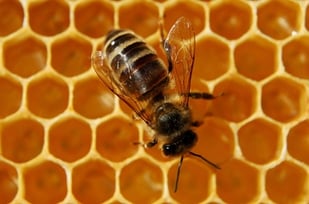 What is exactly causing the decline in bee colonies across North America remains a hot topic for debate. In our September 2014 blog, we addressed the concern of neonicotinoid pesticides, which according to some reports affect the nervous system of insects resulting in paralysis and death. Approved in 1994 in the United States, neonicotinoid pesticides have quickly become the target of environmentalists who claim that it was at the same time that the beekeepers began to notice severe colony loss, upwards of 30-90%.
What is exactly causing the decline in bee colonies across North America remains a hot topic for debate. In our September 2014 blog, we addressed the concern of neonicotinoid pesticides, which according to some reports affect the nervous system of insects resulting in paralysis and death. Approved in 1994 in the United States, neonicotinoid pesticides have quickly become the target of environmentalists who claim that it was at the same time that the beekeepers began to notice severe colony loss, upwards of 30-90%.
The government in Ontario, Canada recently proposed to put a stop to the use of neonicotinoid pesticides by the start of the 2016 corn and soybean planting season. The government “wants farmers to have to prove they actually have pests before they could use certain pesticide-treated seeds that are suspected as being bee-killers.”[i] While nearly all corn crops and two-thirds of soybean crops are treated with the pesticides, farmers and pesticide manufacturers question whether these treated and then buried seeds are actually contributing to the death of bees.
New Plan Gives Bees More Land
The United States has announced a new plan focused on reversing the declining bee population. The government plans to make millions of acres of federal land more bee friendly while also spending millions on research. A recent AP article stated, “The plan calls for restoring 7 million acres of bee habitat in the next five years. Numerous federal agencies will have to find ways to grow plants on federal lands that are more varied and better for bees to eat because scientists have worried that large land tracts that grow only one crop have hurt bee nutrition.”[ii]
According to White House science advisor John Holdren, bees provide more than $15 billion in value to the U.S. economy.
The evaluation proved that the AutoMate-Q40 could successfully process honey samples for pesticide residue using the QuEChERS extraction method. For complete results of the study, including the pesticide levels, download our Application Note: Determination of Pesticide Residues in Honey, by an Automated QuEChERS Solution
[i] http://www.cbc.ca/news/canada/bee-killing-pesticides-the-fight-ramps-up-1.3075620
[ii] http://www.usnews.com/news/politics/articles/2015/05/19/feds-propose-multi-pronged-plan-to-bolster-decline-in-bees
